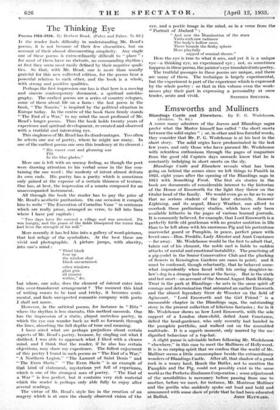The Thinking. Eye
Poems 1914-1934. By Herbert Read. (Faber and Faber. 7s. 6d.) IF the reader finds difficulty in understanding Mr. Read's poems, it is not because of their few obscurities, but on account of their almost disconcerting simplicity. Any single one of these poems is extraordinarily difficult to " place " : for most of them have no rhetoric, no commanding rhythm ; at Brst they seem most easily defined by their negative quali- ties. So that, with Mr. Read,' one is more than usually grateful for this new collected edition, for the poems bear a powerful relation to each other, and the book is a whole, with strong and positive qualities.
Perhaps the first impression one has is that here is a moving and sincere contemporary document, a spiritual autobio- graphy. The earliest poems are a series of country eclogues, some of them about life on a farm : the last poem in the book, " The Nuncio," is inspired by the political situation in Europe today. In the centre of the book there firmly stands " The End of a War," to my mind the most profound of Mr. Read's longer poems. Thus the book holds twenty years of experience and spiritual development, re-created and observed with a truthful and interesting eye.
This singleness of Mr. Read has its disadvantages. Too often he selects one use of poetry, where he might use many. In one of the earliest poems one sees this tendency at its clearest ;
" His russet coat and gleaming axe Flit
In the blue glades."
Here one is left with an uneasy feeling, as though the poet were drawing attention to his verbal sense in the line con- taining the one word : the modesty of intent almost defeats its own ends. His poetry has a purity which is sometimes only gained at the expense of a certain thinness of texture.
One has, at best, the impression of a sonata composed for an unaccompanied instrument.
All through the book the reader has to pay the price of Mr. Read's aesthetic puritanism. On one occasion it compels him to write " The Execution of Cornelius Vane " in sentences which are really prose, arranged as verse, to fall into lines where I have put capitals :
" Two days later He entered a village and was arrested. He was hungry, and the peace of the fields Dissipated the terror that had been the strength of his will."
More recently it has led him into a gallery of word-pictures, that last refuge of the symbolists. At the best these are vivid and photographic. A picture jumps, with alacrity, into one's mind :
" Third block four up the window shut blank uneurtained.
other windows glint grin all sinister within," &c.
but where, one asks, does the element of interest enter into this over-translucent arrangement ? The moment this kind of writing ceases to be taut and tricky, it becomes senti- mental, and finds unexpected romantic company with poets I shall not name.
However, in the satirical poems, for instance in " Ritz" Where the rhythm is less staccato, this method succeeds. One has the impression of a static, almost metreless poetry, in which the eye can wander back as well as forwards through the lines, absorbing the full depths of tone and meaning.
I have -aired what are perhaps prejudices about certain
aspects of Mr. Read's poetry, because, by singling out what I disliked, I was able to approach what I liked with a clearer mind, and I think that the reader, if he also has certain objections, may share my experience. The fullest enjoyment of this poetry I found in such poems as " The End of a War," "A Northern Legion," "The Lament of Saint Denis " and " The Even Skein." " The Even Skein " is an example of that kind of statement, mysterious yet full of experience, which is one of the strangest uses of poetry. " The End of a War " is less perfect, but it 'contains very rich material which the reader is perhaps only able fully to enjoy after several readings.
The virtue of Mr. Read's style lies in the creation of an magery which is at once the closely observed vision of the eye, and a poetic image in the mind, as in a verse from the " Portrait of Abelard "
" And now the 'illumination of the stars Visits with raw radiance The body's hollow cave.
There bounds the fleshy sphere More playfully sapped of seminal rheum."
Here the eye is true to what it sees, and yet it is a unique
eye—a thinking eye, an experienced eye ; not, as sometimes happens in these poems, the painter's eye translated into poetry.
The truthful passages in these poems are unique, and there are many of them. The technique is largely experimental, but the experiment is part of the experience which is expressed by the whole poetry : so that in this volume even the weak- nesses play their part in expressing a personality at once


















































 Previous page
Previous page